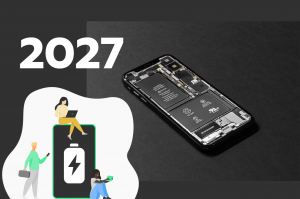The recycling of e-waste must urgently be ramped up because mining the Earth for precious metals to make new gadgets is unsustainable, scientists say.
One study estimated that the world’s mountain of discarded electronics, in 2021 alone, weighed 57 million tonnes.
The Royal Society of Chemistry (RSC) says there now needs to be a global effort to mine that waste, rather than mining the Earth.
The RSC is running a campaign to draw attention to the unsustainability of continuing to mine all the precious elements used in consumer technology.
- Waste electronics to outweigh Great Wall of China
- Millions of old gadgets ‘stockpiled in drawers’
It points out that geopolitical unrest, including the war in Ukraine, has caused huge spikes in the price of materials like nickel, a key element in electric vehicle batteries.
Current reserves of some key elements, researchers say, are simply running out.
“Our tech consumption habits remain highly unsustainable and have left us at risk of exhausting the raw elements we need,” said Prof Tom Welton, president of the Royal Society of Chemistry, adding that those habits were “continuing to exacerbate environmental damage”.
Elements in smartphones that could run out in the next century:
- Gallium: Used in medical thermometers, LEDs, solar panels, telescopes and has possible anti-cancer properties
- Arsenic: Used in fireworks, as a wood preserver
- Silver: Used in mirrors, reactive lenses that darken in sunlight, antibacterial clothing and gloves for use with touch screens
- Indium: Used in transistors, microchips, fire-sprinkler systems, as a coating for ball-bearings in Formula One cars and solar panels
- Yttrium: Used in white LED lights, camera lenses and can be used to treat some cancers
- Tantalum: Used in surgical implants, electrodes for neon lights, turbine blades, rocket nozzles and nose caps for supersonic aircraft, hearing aids and pacemakers
You can read the full report here: https://www.bbc.co.uk/news/science-environment-61350996




